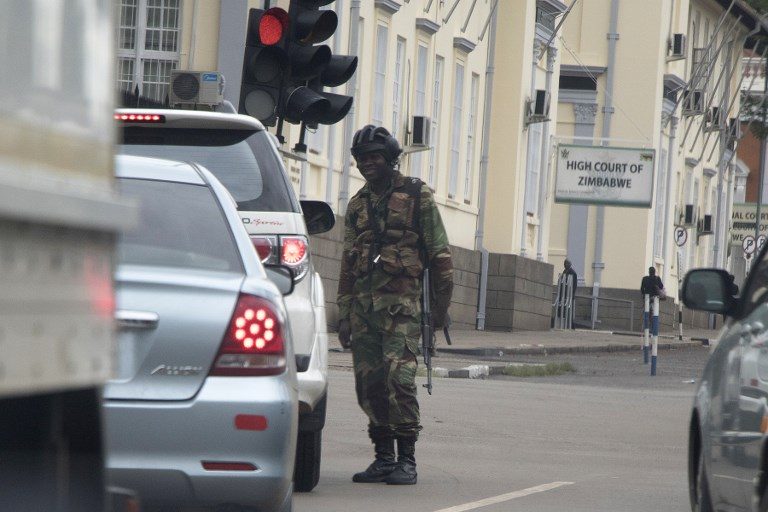SUMMARY
This is AI generated summarization, which may have errors. For context, always refer to the full article.

HARARE, Zimbabwe – A Zimbabwe High Court has ruled that the military takeover that led to Robert Mugabe’s ousting was legal, raising immediate concerns about judicial independence under the country’s new administration.
Army chiefs put military vehicles on the streets of Harare and placed veteran leader Mugabe, 93, under house arrest, before he resigned on Tuesday.
Many Zimbabweans celebrated the end of Mugabe’s 37-year rule, but fear the new government under President Emmerson Mnangagwa could also be an authoritarian regime.
“Actions by the Zimbabwe Defense Forces to stop the usurping of power by those close to former president Robert Mugabe are constitutional,” state-run ZBC media on Saturday, November 25, reported the court as saying.
In an apparent reference to Mugabe’s wife Grace and her supporters, it said the court ruled Friday that the takeover was “to ensure the non-elected individuals do not exercise powers that can only be exercised by (those) elected”.
Grace was alleged to have positioned herself to be Mugabe’s chosen successor, prompting the military to intervene and usher in their preferred candidate Mnangagwa.
Mnangagwa was sworn in on Friday, vowing sweeping changes and moves to attract foreign investment to revive the moribund economy.
He also used his inauguration speech to pay tribute to the increasingly frail Mugabe, describing him as one of the “founding fathers of our nation”.
‘Dangerous precedent’?
“The court has endorsed the military’s interpretation that it is permissible and lawful for it to intervene in the affairs of the executive,” Zimbabwean legal expert Alex Magaisa wrote Saturday.
“This is a dangerous precedent which places the government at risk from the power wielded by the military.”
Alongside another court ruling that Mugabe’s earlier sacking of Mnangagwa as vice president was illegal, Human Rights Watch questioned the courts’ independence.
“Two incredible judgements,” Dewa Mavhinga, southern African director of HRW, wrote on Twitter. “Strange, captured judiciary?”
Mnangagwa, until recently one of Mugabe’s closest allies, took the oath of office at the national sports stadium on the outskirts of Harare before thousands of cheering supporters, dignitaries and foreign diplomats.
The army has warned that criminals have been impersonating soldiers during the political turmoil to extort money from the public and it called on Zimbabweans to obey the law.
Mugabe had ruled since Zimbabwean independence in 1980, exercising almost total authority to crush any sign of dissent and rig elections.
His iron grip on power ended on Tuesday when his resignation letter was delivered to a special parliamentary session where previously-loyal lawmakers had convened to impeach him. – Rappler.com
Add a comment
How does this make you feel?
There are no comments yet. Add your comment to start the conversation.